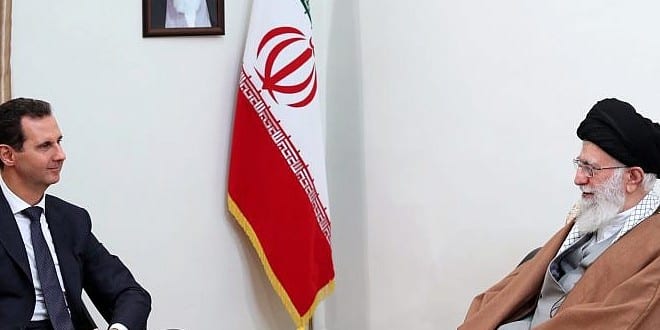The United Arab Emirates foreign minister’s meeting with Syrian President Bashar Assad in Damascus this week is raising eyebrows around the region and in Washington. The visit is symbolic and important, and could mark a shift in the region.
The UAE and other countries have made quiet overtures to Damascus for years, and there is an emerging consensus between the Emirates, Jordan, Egypt, Saudi Arabia and their partners that the time has come to bring Syria and its regime in from the cold.
France 24 noted that “the visit is widely seen as a sign of regional efforts to end Assad’s diplomatic isolation, as Syria grapples with a spiraling economic crisis caused by years of conflict and compounded by Western sanctions.”
The UAE’s official position is that it supports efforts to end the “crisis” in Syria. This is a reference to more than a decade of conflict in the country.
Syria is divided today. The US-backed Syrian Democratic Forces control eastern Syria, Turkey controls parts of northwest and northern Syria, and the regime controls the rest of the country. Russia plays a role in Damascus and Latakia, helping the regime; Iran plays a role in Albukamal, T-4 and near the Golan, where its proxies, such as Hezbollah, threaten Israel.
The UAE wants to see Syria “consolidate stability in the country and meet the aspirations of the brotherly Syrian people,” UAE media reported.
The US is nonplussed. It has tried to isolate the Syrian regime. Up until 2013, there was a thought that Washington might intervene on behalf of the Syrian rebels, who became more fractured over time and more extreme. As ISIS took over part of Syria and committed genocide in 2014, US policy shifted.
Amid the Iran deal, the US moved to fight ISIS with an international coalition, and efforts to remove Assad ended. Under the Trump administration, the US shifted to a closer partnership with Israel on concerns about Iranian entrenchment in Syria. However, America also was cut out of discussions by the Russia-backed Astana process. Russia, Turkey and Iran sought to run Syria.
Turkey invaded the country beginning in 2016 and ethnically cleansed Kurds. Russia helped the Assad regime retake Aleppo in 2016. The US helped the Syrian Democratic Forces defeat ISIS. In 2019, the Trump administration betrayed its own SDF partners and enabled a Turkish invasion, but then backtracked on withdrawing from Syria. Now the situation looks like a frozen conflict.
Images are deceiving, however. In 2018, the regime retook the areas near the Golan. It has sought to reopen relations with Jordan and possibly even import fuel from Egypt to help Lebanon meet its energy needs. The US, meanwhile, maintains sanctions on the regime. Like Iran, an ally of Assad, the regime wants outreach to China.
The UAE visit is important because the Emirates is a key partner of the US and also because it has a peace deal with Israel.
“This administration will not express any support for efforts to normalize or rehabilitate Bashar Assad, who is a brutal dictator,” State Department spokesman Ned Price told reporters this week.
But the US must say this: It knew the visit was coming.
America is already concerned about its partners in the region. Washington is estranged from both Cairo and Riyadh on key issues. The US is also angered by a recent coup in Sudan. The sand in the region appears to be slipping out from under America’s feet. That means that it has problems with most of its traditional allies and friends. Ankara is now run by an anti-American regime that buys weapons from Russia and abuses migrants and human rights.
Insofar as there is a pro-US alliance system, it is the one that is made up of Israel, Greece, Cyprus, the UAE, Egypt, Saudi Arabia, Bahrain and Jordan. Oman, Tunisia, Morocco and Kuwait can be seen as important, stable states as well. Iraq is held hostage by Iran, except for the autonomous Kurdish part. But even there the Iranians have sent a delegation this week. Turkey has threatened new invasions of the Kurdish region in Syria and bombs Kurdish areas weekly.
There are now questions about US policy on Syria. On the one hand, America seemed to indicate that Jordan and Egypt might supply Lebanon with energy via Damascus. On the other hand, the US may reconsider its role in eastern Syria. Brett McGurk, architect of American policy with the SDF and a key US official today, may oppose that.
There are some in the Biden administration who want to go softer on Iran. Others want to be tough, and the US has put in place new sanctions against Iran’s drone program. But Tehran is also trading oil with Beijing, up until a recent incident in which Iran stopped a tanker full of its own oil which had returned from China.
US comments portray the UAE trip as problematic. That means it’s likely not a trial balloon for the Biden administration. It is worth recalling here that the Emirates was making overtures to Assad back in December 2018. Syria’s intelligence chief Ali Mamluk has also been meeting with Egyptians since 2016, with a key visit in December 2018, around the time the UAE signaled a new opening to Damascus.
Russian President Vladimir Putin hosted Assad in September 2021 and Prime Minister Naftali Bennett in October. Egypt, Jordan and Syria agreed on an energy plan in September. Jordan’s king received a phone call from Assad on October 3. It was the first time in a decade the men officially spoke.
Syria also sent one of its ministers to visit Saudi Arabia in May, another first visit in a decade. It is believed that the Gulf states are now open to new investment in Syria. They are treading lightly and moving slowly and pragmatically.
In the West, this move by the UAE may be seen as controversial. This is because in some sectors, especially in the US, the Assad regime is seen as a personification of evil. It is seen by some as worse than Iran, having committed vile abuses over the years. While there are voices in Washington who want a soft approach to Iran, there tends to be a consensus that Assad is a bad actor.
Prior to 2011, this was not the case. Those, like former US secretary of state John Kerry, who opposed Israel’s peace with the Gulf wanted to explore better ties with Tehran and Damascus.
But there is another narrative, one that is common among those who have backed the Syrian rebels: that the Assad regime must be opposed.
Turkey and Qatar are sometimes seen as key to opposing the regime. As such, this narrative posits that the UAE and Saudi Arabia are part of an authoritarian system in the region, seeking to work with fellow authoritarian Assad.
However, Turkey and Qatar are also authoritarian states, so the overall question is which of these alliance systems one prefers.
The Turkey-Qatar system tends to be close to Hamas, the Taliban and extremist groups. The Saudi-led system tends to be close to authoritarian regimes that are ostensibly more secular. The Iranian system backs Hamas, Hezbollah, Iraqi militias and other proxies that are eating away at countries.
When the UAE says it wants “stability,” it is arguing that the instability caused by Iran – and by Turkey’s role in Idlib in Syria, and with Hamas in Gaza and in Libya – is the greater threat.
For a Washington that has withdrawn in places like Afghanistan, the question will be whether the new initiative by the UAE and other pro-American countries can bring stability or achieve any goals that the US might want to achieve.
What most countries have learned is that as the US takes a back seat in the region, preferring to concentrate on China, other countries have been left to take the reins and see what may come next. The UAE is trying to be part of that process.
For Israel, a key issue will be whether the Iranian threat can be reduced in Syria as part of this new stability that the Gulf countries think might be enabled. For this reason, the UAE is working closely with Jordan on discussions about the region.
The issue is that the Assad regime has in the past pretended it would reduce Iran’s role. It said this before 2011 and even during the conflict. But the Iranians continue to have a major role in Syria.
The calculus for the new trend is clear. The UAE and Saudi Arabia want “stability” in the region. They oppose the Muslim Brotherhood. Turkey’s regime is led by the AKP, which has roots in the Brotherhood. Hamas is linked to the Brotherhood, as are the former regime in Sudan, which was pushed out in 2019, and the former Morsi regime in Egypt. Qatar is close to Turkey and the Brotherhood.
The regional rivalry in this context is one in which Riyadh, Abu Dhabi and Cairo see Assad as potentially returning to the Arab League states and being a bulwark against extremists in Idlib, as well as possibly moving him away from Iran. The Assad regime is poor and weak and must rely on Iran. The belief is that with a little support, the regime might adjust its stance slightly.
Israel’s position here is complex. The Jewish state has improved relations with Jordan, Egypt, the UAE and Bahrain, key states involved in the Syria initiative. It had decent relations with moderate rebel groups near the Golan until they were defeated in 2018 by the Assad regime. Since then, Israel has worked to prevent Iranian entrenchment in Syria. But Jerusalem also has decent relations with Moscow and has held talks with Russia about Syria.
Reprinted with author’s permission from Middle East Forum






